'Difficult to breathe': Sentosa residents unwell from effects of oil spill; yacht companies predict losses
One yacht company says it expects to lose about S$3,200 in a day due to the oil spill.
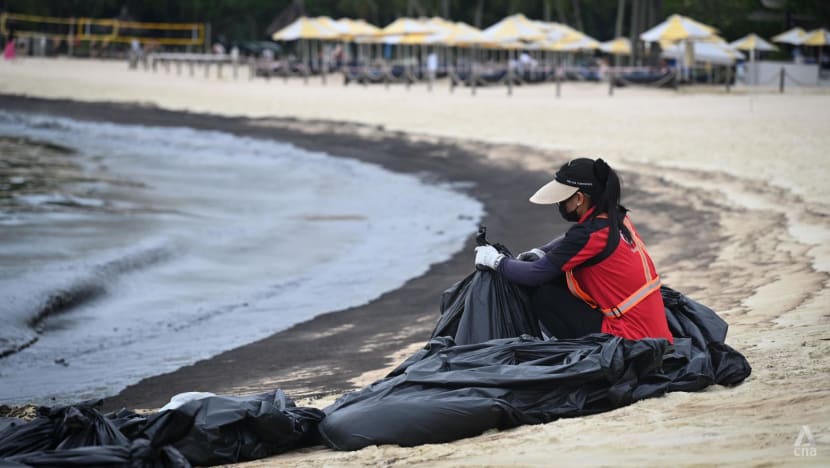
A worker cleaning up Sentosa's Tanjong Beach on Jun 15, 2024, after an oil slick spread from a spillage at Pasir Panjang Terminal the day before. (Photo: CNA/Syamil Sapari)

This audio is generated by an AI tool.
SINGAPORE: The oil spill at Pasir Panjang Terminal has had a wider impact beyond the blackened beaches, with some residents at Sentosa Cove forced to briefly vacate their homes on Saturday (Jun 15) due to the smell.
Yacht businesses have suffered losses, while tourists were left disappointed by the pollution.
The beaches of the island resort of Sentosa were among those hit by the oil slick, which was caused when a dredger hit a stationary bunker vessel at the port on Friday afternoon.
A section of East Coast Park and parts of Labrador Nature Reserve were closed until further notice for clean-up efforts.
Yacht businesses with boats berthed at Sentosa Cove said all their vessels had been unable to leave the marina since Saturday morning when the entrance was blocked off.
Speaking to CNA from the docks, employees said they were notified of the decision at about 11.45am.
An employee of YachtCruiseSG said the company cancelled four reservations on Saturday, with losses amounting to about S$800 (US$590) per reservation and around S$3,200 for the day.
The staff said the company has four more reservations on Sunday and two on Monday. More business could be lost as they are not sure when boats in the marina can go out to sea again.
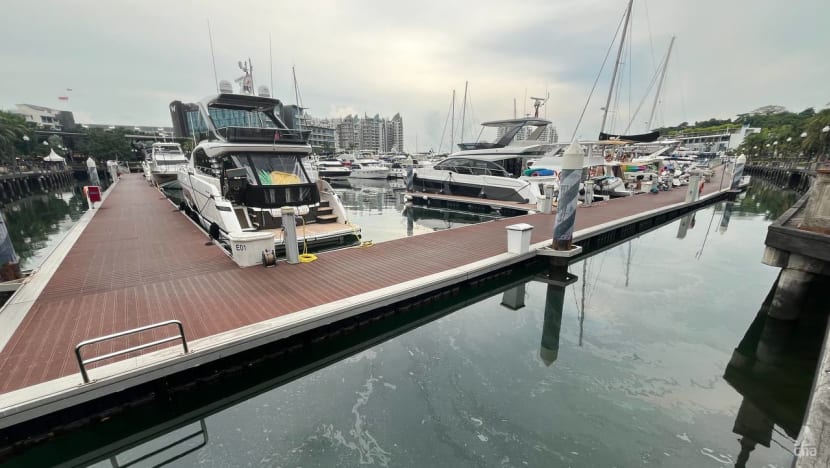
CNA saw at least three groups of yacht owners or renters sitting in vessels at the marina, unable to go out to sea.
A group of five young adults said they had planned to go to St John’s Island for a short day trip, but these plans were canned due to the oil spill.
Sentosa Cove is also home to several condominiums. Some residents said they woke up to a pungent "kerosene" smell wafting into their apartments instead of the usual sea breeze.
“I felt as if someone was painting or washing something with a chemical product, then I realised when I looked into the ocean, that I saw a different colour,” said Sergio Abe, who stays in The Coast condominium.
The 44-year-old closed all his doors and windows and turned on the air conditioning, but the smell still lingered.
"It was a bit difficult to breathe in the morning," said Mr Abe, who said his six-year-old son also began to cough and feel dizzy.
As a precaution, the family travelled out of Sentosa to spend the rest of the morning at Orchard Road, away from the smell of the fumes.
It was an experience shared by Mr Brett Garrity, whose house is close to the sea.
“We woke up this morning and opened our doors and typically it’s just a nice breeze, but the pungent smell came through … it was pretty potent,” said the 39-year-old who works in the IT industry.
Like Mr Abe, he also left the island with his family for the rest of the morning as a precaution.
"It’s definitely not something you want your kids to be breathing in ... so I do hope that it gets cleaned up pretty quickly," said Mr Garrity, who has two sons aged nine months and three years old.
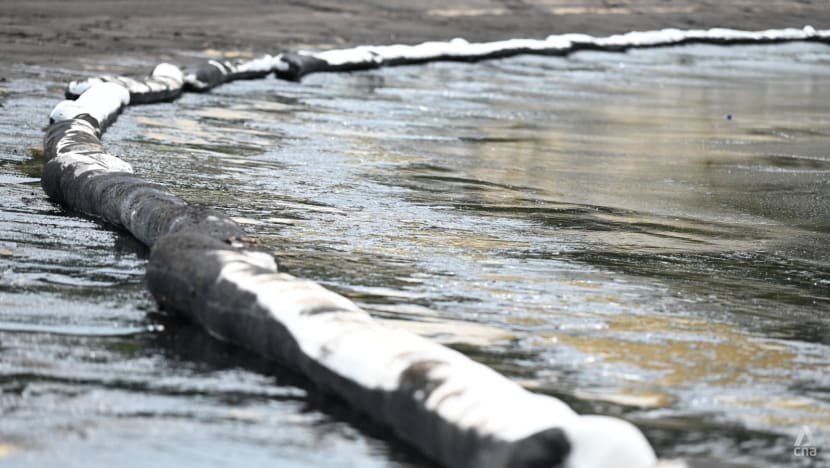
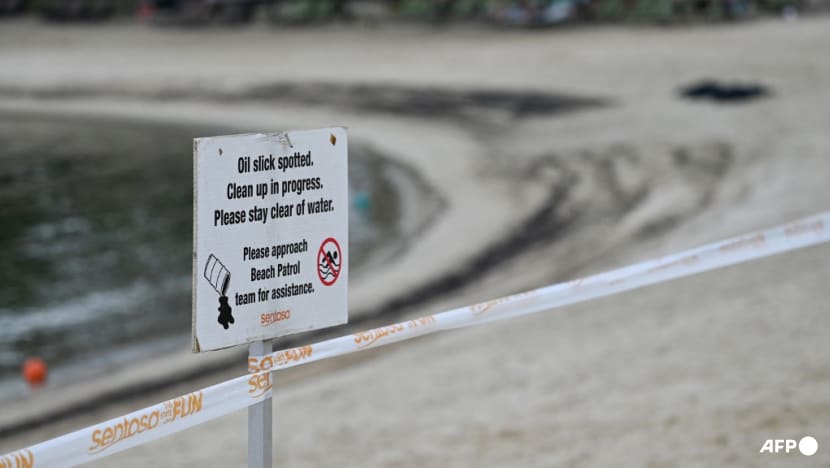
BEACHGOERS IRRITATED BUT MOST UNDETERRED
While Sentosa's beaches at Palawan, Siloso and Tanjong remain open to the public, swimming and sea activities were not allowed for the time being.
There were several cleaners plying Tanjong Beach with shovels and black garbage bags, dredging some of the oil and pollutants into the bags.
Mr Jeremy Teng, who was having a staycation at a Sentosa hotel, told CNA that he had gone to several beaches with his wife and three young children to assess the situation, before finding a spot a safe distance away from the water.
He said the smell was a health concern and that he may cut short his time at the beach.
"We were hoping to spend a bit more time at the beach, but it is out of our control,” said the 44-year-old HR manager.
His children were playing on the sand a distance away from the blackened waters, but Mr Teng said he had to explain why they couldn’t go near the water.
“When they could see the oil and the blackening of the water, they understood (why they can’t play),” he said.
Teacher Debbie Chew had travelled to the beach at about 11am to reserve a spot to play beach volleyball with her friends but was surprised by the pungent smell of the oil.
“There was a strong smell when I was on the tram (to the beach), and when I got here it was already barricaded, and I realised it was the smell coming from the petroleum,” said the 22-year-old.
She said they did not hesitate to continue playing and the stench eventually waned, although one of her friends went home early as he felt dizzy from the smell. They were also worried about the volleyball potentially rolling into the water.
Foreign visitors were also left disappointed.
German Stefan Schmidt was in Singapore for a work trip. He only had one free day to explore the city.
“I just looked at the map of Singapore, and thought that I could go to a beach just to explore a little bit,” said the 60-year-old physicist. “I didn’t expect it, but I guess not every day is like this.”
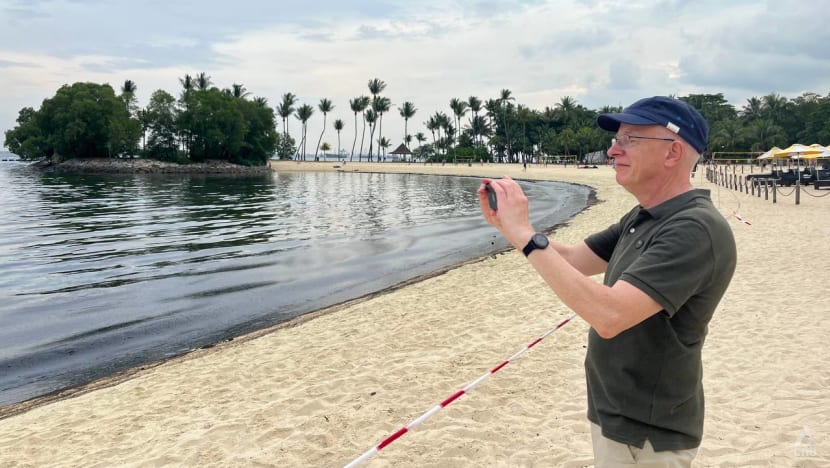
A group of Chinese tourists had their photo opportunity spoiled by the pollution.
“Tanjong Beach is a popular photo spot because Jay Chou had come here before, but because of this incident, there’s no way I can take any photos,” said 29-year-old tourist Gao Jia from Xinjiang, China.
“I was thinking, with the sunset, this place would look beautiful … now I just feel very disappointed,” she said in Mandarin.
IMPACT ON MARINE LIFE
Sentosa Development Corporation said earlier on Saturday that apart from cleaning up the beaches, it is also focusing on minimising the impact on its waters and surrounding wildlife.
Local conservation group Marine Stewards told CNA that the affected marine wildlife appeared to be mainly around the Southern Islands, although it is too early to see the full extent of the damage.
According to Marine Stewards founder Sue Ye, the group is aware of one kingfisher that has been rescued from Marina at Keppel Bay. Another kingfisher was seen covered in oil at Lazarus Island.
"We have also seen photos of dead fish, and otters covered in oil," she said.
The non-governmental organisation is helping to facilitate the rescue and rehabilitation of any affected marine wildlife together with Friends of Marine Park. ACRES is also ready to assist, said Ms Ye.
"It is still too early to see the full extent of the damage as different animals may be affected in different ways," she added.
"We do not know if all of the oil is getting adequately cleaned up, or how long that will take, as the oil spill covers a large area between Pasir Panjang all the way to East Coast Park. Cleaning up the oil may involve the introduction of even more chemicals into the water that could affect marine life."
Singapore authorities said that the oil spill from the vessel had been contained and there had been no further leak from the ship since Friday evening.
"The oil that escaped from the damaged tank had been treated by dispersants," they added.
"Close to 1,500 metres of container booms have been deployed and more will be laid over the next few days to prevent further spread of oil onto the shore, and facilitate the recovery of the trapped oil off the affected shorelines and lagoons to prevent them from going back to sea."














